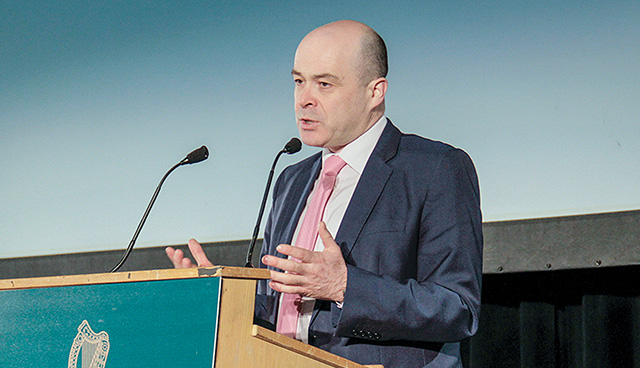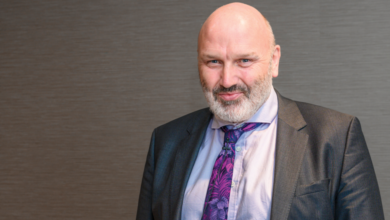Communications Minister: Denis Naughten TD


Ireland is entering into the digital and decarbonised age, bringing with it enhanced innovation. However, for rural Ireland, little has changed. eolas assesses the most pressing challenges currently faced by Communications Minister, Denis Naughten TD.
As Minister Naughten progresses into his third year in cabinet, the challenges represented in his portfolio are considerable. Of particular significance is the Government’s National Broadband Plan (NBP), which seeks to revolutionise Ireland’s current broadband landscape. Delivered through combined investment from both commercial and state-led bodies, the NBP is intended to ensure that all parts of Ireland will have access to a modern and reliable broadband network. The plan’s successful implementation will guarantee high-speed broadband to those living in some of the island’s remotest areas.
Ambitious as the plans are, the NBP has faced constant obstacles in its implementation. The departure of UK-listed utility giant SSE has left Enet as the sole remaining bidder in the tender process, meaning that the project is now lacking the key industry player required to build the required communications infrastructure from scratch. In spite of SSE’s withdrawal, both the Government and the remaining Enet consortium have pledged to forge on with the €1.5 billion plan which would see the laying of over 110,000 km of fibre-optic cable in remote and often difficult terrain.
It is believed that the withdrawal of several major stakeholders, including Eir and Vodafone has led to a situation in which Ireland’s rural broadband tender process faces a potentially imminent collapse. For Naughten, the withdrawal of key commercial support presents a significant threat to his reputation as Communications Minister – and to a government which lost swathes of electoral support in the last general election for its apparent Dublin-centrism at the expense of rural areas. Indeed, the unexpected departure of Enet Chief Executive Conal Henry, who initially spearheaded Enet’s bid for the NBP will have added further upset to what the opposition have described as a “shambles”.
Enet’s position as the sole bidder in the NBP has placed Naughten and his Department in a position with little room to negotiate with the firm over costs and timescales. Furthermore, the implications of commercial withdrawal fundamentally challenge the Minister’s styling of Ireland as a future hub of technology and telecommunications – a characterisation based upon promises made by the Government since the plan’s launch in 2012. It is believed that the Government and Enet’s decision to continue with the plan represents a strategy that is designed to limit the reputational damage now faced by both parties.
The breakdown of the tender process has raised questions on the future of foreign direct investment in Ireland, with the revenue granted by the NBP originally predicated on the uptake of broadband contracts. The 2015 commitment of €275 million as part of the Government’s capital development plan, whilst substantial, represents only an “initial stimulus” for this ambitious project. Indeed, the NBP, overseen by Naughten, will require further State and commercial funding over the course of its 25-year lifespan. Once seen as a contender for Fine Gael’s leadership, the Roscommon-native is responsible for finalising the plans, which to date remain uncertain and under heavy scrutiny.
“For Naughten, the withdrawal of key commercial support presents a significant threat to his reputation as Communications Minister – and to a government which lost swathes of electoral support in the last general election for its apparent Dublin-centrism.”
The implementation of the National Broadband Plan is not the only challenge faced by Denis Naughten, however. Along with Minister of State Seán Kyne and other officials in DCCAE, Naughten is tasked with driving forward the implementation of actions identified by the Mobile Phone and Broadband Taskforce. The Taskforce was launched with the objective of developing practical solutions for broadband and mobile phone users who are currently experiencing blackspots in coverage, as well as other telecommunication issues. Fortunately for Minister Naughten, the Taskforce has recorded a number of initial successes. These successes include the provision of more streamlined planning processes and a reduction in associated planning permission costs for commercial operators deploying telecommunications infrastructure.
Beyond the improvement of planning processes, the Taskforce has also been accredited with the development and introduction of an online system which guarantees a more efficient application process for operators with faster turnaround timelines. Broadband officers have been appointed in each of the 31 local authorities where they will act as contact points for both telecommunication operators and members of the public.
Notably, the Taskforce, which is overseen by Naughten, has made significant progress in the building of ducts in Ireland’s motorways in conjunction with Transport Infrastructure Ireland. The upgrading of Ireland’s motorways will see the introduction of an infrastructural backbone for the provision of nationwide high-speed broadband. However, with little progress on the NBP and in the absence of an infrastructural expert, the capabilities of these ducts will, of course, be limited.
Beyond the obstacles in Naughten’s portfolio of broadband, telecoms and climate control, the Minister faces his own personal challenges. Naughten’s intervention in the proposed takeover of the Celtic Media Group has cast further doubt on his judgement, where he reportedly advised a PR executive that the takeover would be referred to the Broadcasting Authority of Ireland (BAI) two months before this was made public.
The disruption of the NBP combined with his role in the Celtic Media affair could represent further obstacles to his political future.





